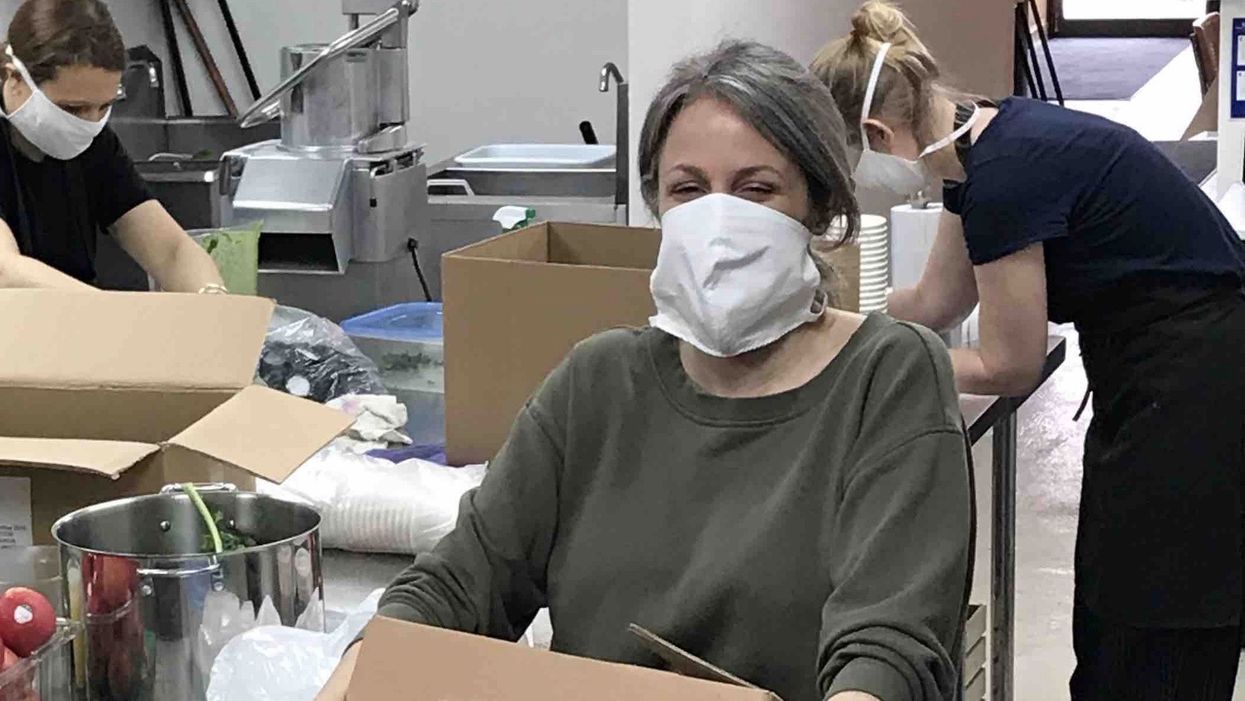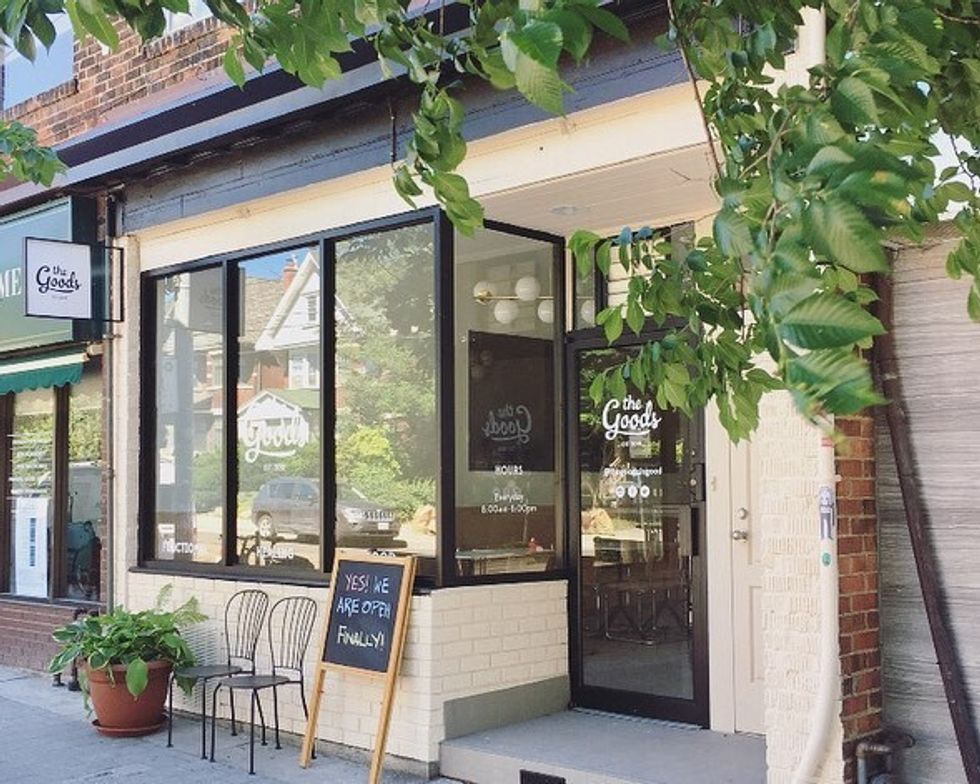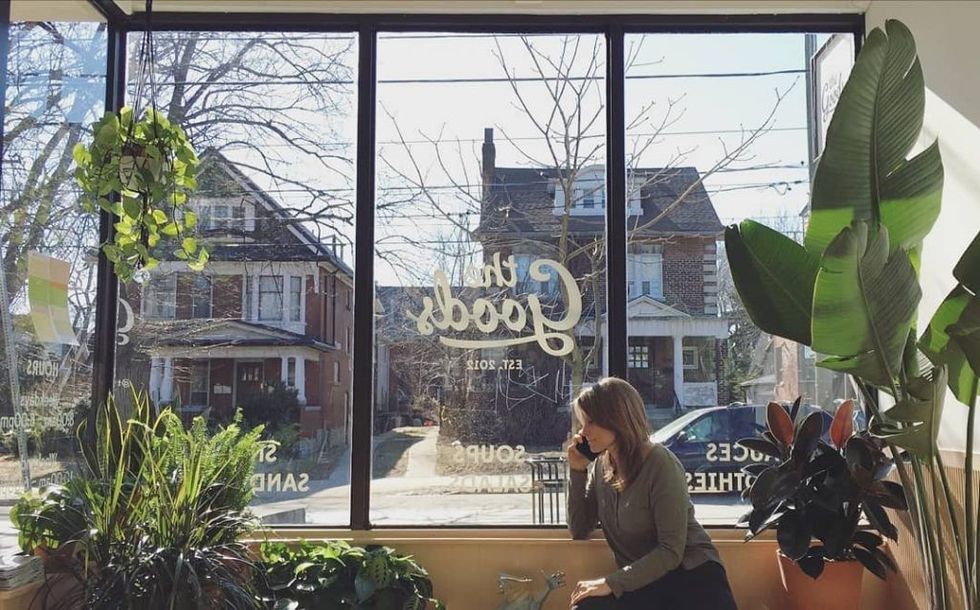Lisa Labute asks me to hold so she can hop out of her car to drop off fresh produce and herbs, rices, seed mixes, and a few prepared meals on a doorstep.
We're talking on the phone as she drives across town making deliveries. She's alone. At the beginning of March, she had a staff of 10. Now, it's just her and a couple of staff members working on an 'as-needed' basis. Just a few weeks ago the only way to get her food delivered was through Uber Eats, now Labute is bringing it right to people's doors because Uber Eats takes a cut and there's no room for more cuts right now.
Labute runs The Goods, a dine-in and catering restaurant on Roncesvalles Avenue in Toronto that specializes in vegan and vegetarian soups, salads and smoothies. To say she's food-focused is an understatement. About 10 years ago, Labute left her advertising job to go all-in on conscious eating. It's had its ups and downs, but The Goods has not only survived, it has grown through several iterations, moving all the way from a borrowed kitchen in its early days to a walk-in and pick-up style spot on Dundas West, before eventually landing in the aforementioned dine-in location on Roncesvalles.
Through all of it, nothing prepared Labute for the last three weeks.
"I was devastated for the first couple of weeks. Now, I'm in survival mode."
Last week, a Restaurants Canada survey released some shocking statistics about the restaurant industry in both the country and province. Across Canada, an estimated 800,000 foodservice jobs had already been lost, with 300,000 of those being located in Ontario. Four out of five restaurants had laid off employees since March 1, while seven out of 10 will further cut back on staff hours or lay off more employees if conditions do not improve.
What's more, nearly 10% of restaurants have already closed permanently, and another 18% will permanently close within a month if current conditions continue.
“Not only was our industry among the first to feel the impacts of COVID-19, we’ve been one of the hardest hit so far, with nearly two-thirds of our workforce now lost,” said Shanna Munro, Restaurants Canada President and CEO. "In our 75 years of existence as Canada’s national foodservice association, these are by far the worst numbers we have ever seen.”
"A small business can't run without money flowing through it," Labute says as she drives back to her store to get more fresh produce for another delivery. She says a $25,000 loss in revenue would be a rough estimate for the hit she's taken so far. After all, nobody is dining-in and nobody is ordering catering right now – two pillars of her business model. On top of that, another tenant of her model is to only work with other small, independent businesses, many of which are also struggling or closing right now. Labute received a large order of dry goods right as everything was starting to get shut down, she's worried what will happen when she tries to place her next order.
"If they [the government] lockdown any further we could be in real trouble. We're at their mercy right now."
When asked if she'll apply for the federal government's new COVID-19 wage subsidy, Labute says of course, and that it will likely help but, the government "needs to move faster, they can't announce a subsidy and then take weeks to fulfill it. We need money now, not in mid-April." If The Goods qualifies for the subsidy, it will cover 75% of the first $58,700 each employee earns, so up to $847/week.
By March 17, the Canadian Federation of Independent Business (CFIB) had already released a report outlining the survival rates for small businesses in Canada. The report found that 25% of small businesses would not be able to survive for more than a month with a drop in business income of more than 50%. Labute puts her losses somewhere around 80% so far.
So she's pivoted her business to try to get through the pandemic. You can now order delivery online, and The Goods will bring you its fresh menu items, meal kits you can put together at home, and produce orders.
"It's not even just about the restaurant at this point, it's about the 10 people who can't afford rent right now," Labute says about keeping the business alive. She has every intention of hiring them back as soon as she's able to. Labute also rents, both her apartment on Dundas West and the store location on Roncesvalles. She leases The Goods space from a local landlord who she says has been flexible, but is also nervous about how he'll survive the situation too.
The Goods is just one of thousands of restaurants in Ontario experiencing this level of devastation.
Despite all of this, Labute manages to remain positive. "I've always been a hustler," she says through light laughter, just seconds before hanging up the phone to get another carload of fresh food to deliver to some waiting porch in the crisis-stricken city.
If you'd like to support The Goods you can do so by ordering from them here.























